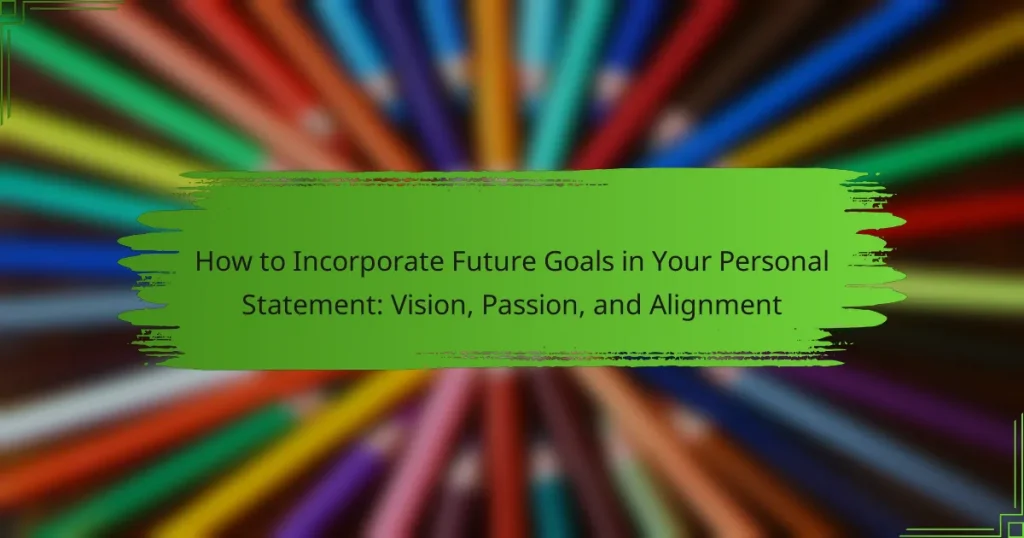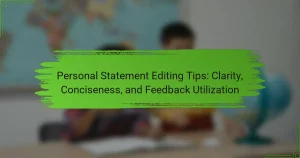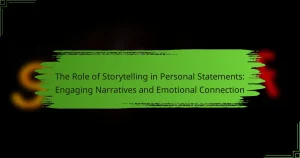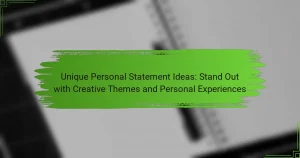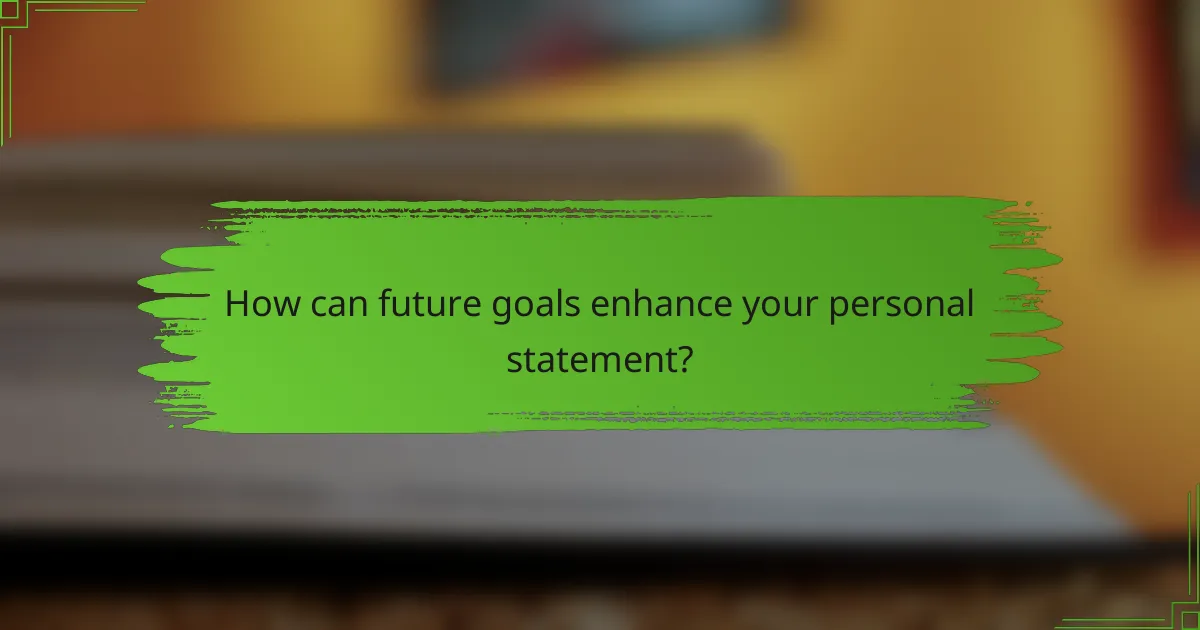
How can future goals enhance your personal statement?
Future goals enhance your personal statement by providing direction and purpose. They demonstrate your aspirations and commitment to growth. This clarity can make your narrative more compelling. Admissions committees value candidates who have a clear vision for their future. A well-defined goal can illustrate your motivation and passion for your chosen field. It can also show alignment with the program’s values and offerings. For instance, mentioning a specific career path can highlight relevant experiences and skills. This connection can strengthen your overall application.
What role does vision play in articulating future goals?
Vision serves as a guiding framework for articulating future goals. It provides clarity on desired outcomes and inspires motivation. A well-defined vision helps individuals identify specific objectives aligned with their values. This alignment fosters a sense of purpose, making it easier to set actionable steps. Research indicates that individuals with a clear vision are more likely to achieve their goals. For example, a study by Locke and Latham (2002) found that goal-setting linked with a strong vision enhances performance. Thus, vision is crucial for effective goal articulation and achievement.
How can you define your vision for the future?
To define your vision for the future, identify your long-term goals and aspirations. This involves reflecting on what you value most in life. Consider your passions and how they align with your desired career path. Write down specific objectives you wish to achieve. Use visualizations to imagine your ideal future scenario. Research shows that individuals with clear visions are more likely to succeed in their endeavors. According to a study by the Dominican University of California, setting specific goals increases the likelihood of achievement by 42%.
Why is a clear vision essential for a personal statement?
A clear vision is essential for a personal statement because it guides the narrative and showcases the applicant’s goals. This clarity helps to communicate aspirations effectively. A well-defined vision connects personal experiences with future objectives. It demonstrates to admissions committees that the applicant has thought deeply about their path. Research indicates that personal statements with clear goals are more impactful. A study by the National Association of Colleges and Employers found that clarity in career goals significantly enhances candidate appeal. Thus, a clear vision strengthens the overall message of the personal statement.
How does passion influence the incorporation of future goals?
Passion significantly influences the incorporation of future goals by driving motivation and commitment. Individuals with passion are more likely to set ambitious goals. This enthusiasm fosters resilience in the face of challenges. Passionate individuals often engage in deeper exploration of their interests. They are inclined to seek out opportunities that align with their goals. Research indicates that passion enhances focus and persistence, leading to higher achievement rates. In a study by Vallerand et al. (2003), passionate individuals reported greater satisfaction and success in their pursuits. Thus, passion acts as a catalyst for defining and pursuing future goals effectively.
What are the key elements of passion in a personal statement?
The key elements of passion in a personal statement include authenticity, personal experiences, and specific goals. Authenticity reflects genuine emotions and beliefs. Personal experiences demonstrate how passion has shaped the individual’s journey. Specific goals illustrate how that passion will guide future aspirations. Together, these elements create a compelling narrative that resonates with readers. Passion must be conveyed through clear, vivid language. This clarity helps to engage the audience and make the statement memorable.
How can you effectively convey your passion in writing?
To effectively convey your passion in writing, use vivid language and personal anecdotes. Vivid language engages readers and paints a clear picture of your feelings. Personal anecdotes provide authentic experiences that resonate with your audience. Show enthusiasm through expressive tone and varied sentence structure. This approach keeps readers interested and invested in your message. Research indicates that emotional storytelling can significantly impact reader engagement and connection. According to a study by the University of Pennsylvania, narratives that evoke emotions increase retention and understanding.
What is the importance of alignment in expressing future goals?
Alignment is crucial in expressing future goals as it ensures consistency between aspirations and actions. Clear alignment helps in articulating a coherent vision. It allows individuals to set achievable milestones that reflect their values. When goals align with personal beliefs, motivation increases. Studies show that aligned goals lead to higher success rates. For instance, research by Locke and Latham indicates that goal-setting enhances performance when there is alignment. This alignment fosters commitment and accountability in pursuing objectives. Overall, alignment plays a vital role in guiding decision-making and prioritizing efforts towards future aspirations.
How can you ensure alignment between your goals and experiences?
To ensure alignment between your goals and experiences, regularly evaluate your objectives and past actions. This involves setting specific, measurable goals that reflect your values. Assess your experiences to identify skills and insights that support these goals. Seek feedback from mentors or peers to gain perspective on your alignment. Make adjustments as necessary to stay on track. Research shows that individuals who align their goals with their experiences report higher satisfaction and achievement rates. For instance, a study by Locke and Latham (2002) emphasizes the importance of goal-setting in enhancing performance.
Why does alignment matter for your audience?
Alignment matters for your audience because it ensures that the content resonates with their values and expectations. When your message aligns with their interests, engagement increases. This connection fosters trust and loyalty. Research indicates that aligned messaging can lead to a 23% increase in audience retention. Furthermore, alignment enhances clarity, making it easier for the audience to grasp the intended message. Ultimately, alignment drives action, prompting audiences to respond positively to calls-to-action.
How can you transition from broad goals to specific details?
To transition from broad goals to specific details, start by breaking down the overarching goal into smaller, actionable steps. Identify key milestones that represent progress toward the broad goal. Use the SMART criteria to define these steps: Specific, Measurable, Achievable, Relevant, and Time-bound. For instance, if the broad goal is to enhance career prospects, a specific detail could be obtaining a relevant certification within six months. Prioritize these steps based on urgency and importance. Regularly review and adjust the details as needed to ensure alignment with the broader goal. This structured approach helps clarify the path forward and maintains focus on achieving the overall objective.
What strategies can help in connecting vision, passion, and alignment?
To connect vision, passion, and alignment, one effective strategy is to create a clear roadmap. This roadmap should outline specific goals and milestones. Each goal must reflect personal values and aspirations. Regular reflection on these goals helps maintain alignment with one’s vision. Engaging in activities that ignite passion reinforces commitment to the vision. Seeking feedback from mentors or peers can provide valuable insights. This feedback can highlight areas of misalignment or growth opportunities. Additionally, maintaining flexibility allows for adjustments as circumstances change. These strategies foster a cohesive connection between vision, passion, and alignment.
What specific elements should you include when detailing future goals?
When detailing future goals, include specific elements such as clarity, relevance, and measurable outcomes. Clarity ensures that goals are well-defined and easily understood. Relevance connects the goals to your personal values and aspirations. Measurable outcomes allow for tracking progress and evaluating success. Additionally, timeframes provide deadlines for achieving each goal. This structured approach enhances the effectiveness of your personal statement. Studies show that clear and specific goals increase motivation and likelihood of achievement.
How can you structure your personal statement to reflect your goals?
To structure your personal statement to reflect your goals, start with a clear introduction that outlines your objectives. This sets the tone for your statement. Next, detail your relevant experiences that align with these goals. Use specific examples to illustrate your journey. Discuss the skills you have gained and how they contribute to your future aspirations. Additionally, emphasize your passion for the field you are pursuing. This connection strengthens your narrative. Finally, conclude with a strong statement that reiterates your commitment to achieving your goals. This structure ensures clarity and coherence in conveying your vision.
What common pitfalls should you avoid when writing about future goals?
Common pitfalls to avoid when writing about future goals include being vague or overly general. Specificity enhances clarity and engagement. Another pitfall is failing to connect goals to personal experiences. This connection provides authenticity and relatability. Additionally, avoiding unrealistic goals is crucial. Setting achievable milestones demonstrates practicality. Neglecting to show passion can diminish impact. Genuine enthusiasm resonates with readers and strengthens your narrative. Lastly, omitting a timeline can lead to ambiguity. Clear timelines provide structure and urgency to your goals.
What are the best practices for incorporating future goals into your personal statement?
Clearly articulate your future goals in your personal statement. Use specific, measurable objectives to convey your aspirations. Align these goals with your past experiences and current skills. This connection demonstrates coherence in your narrative. Include a timeline for achieving your goals to show commitment. Highlight how the program or opportunity will facilitate these goals. Use concrete examples to illustrate your vision for the future. Ensure your passion for these goals is evident throughout your statement.
The main entity of the article is the incorporation of future goals in personal statements, emphasizing the importance of vision, passion, and alignment. The article outlines how clearly defined future goals enhance personal statements by providing direction and demonstrating commitment to growth. It discusses the role of vision in articulating goals, the influence of passion on motivation, and the significance of aligning personal experiences with aspirations. Additionally, the article offers strategies for articulating specific goals, avoiding common pitfalls, and structuring personal statements effectively to convey a compelling narrative.
